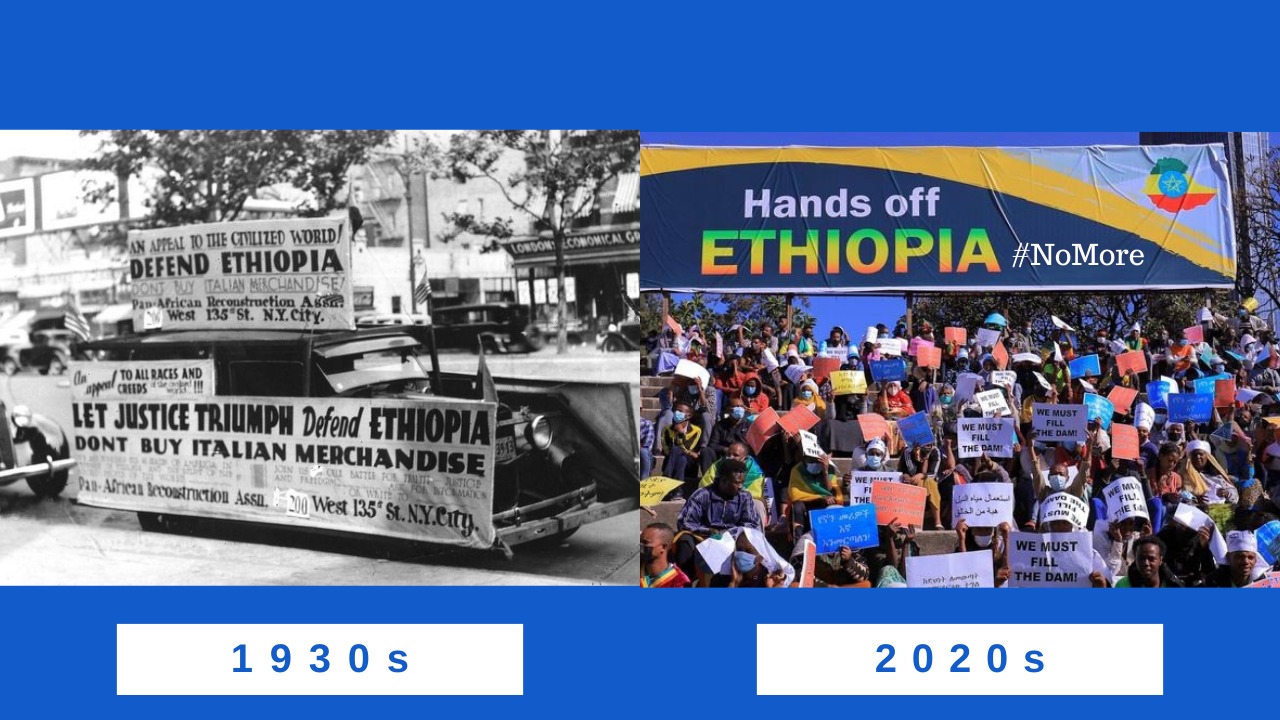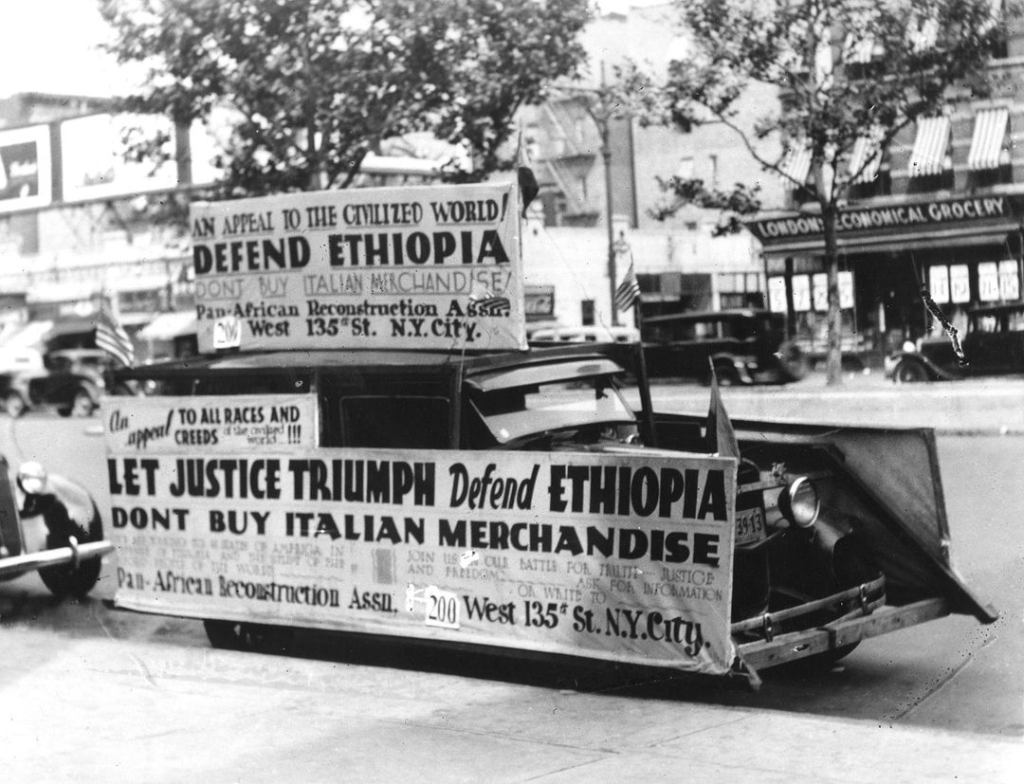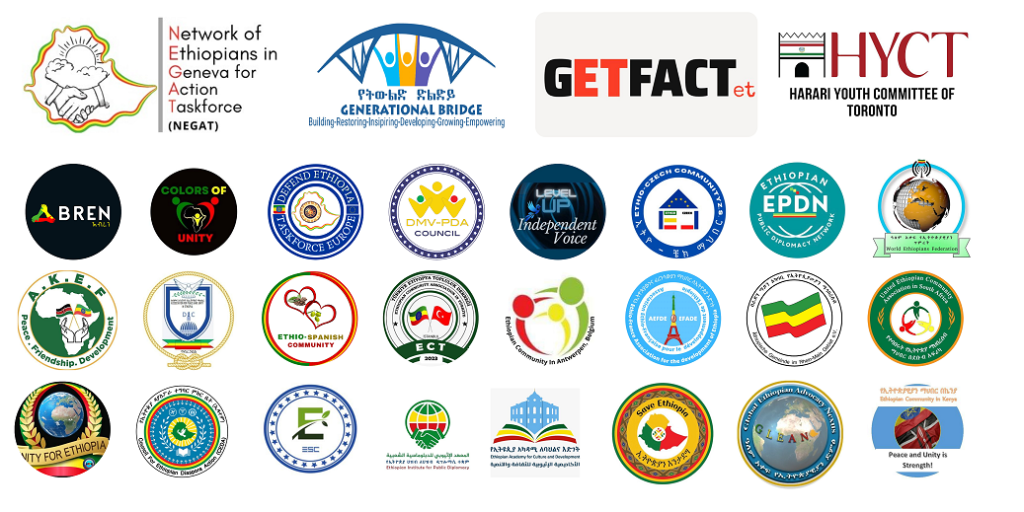
By the Steering Group of the Defend Ethiopia Task Force in Europe – September 2023
Defend Ethiopia Movement in the 1930s

In the 1930s, Harlem, a neighborhood in New York City, played a significant role in supporting the defense of Ethiopia during the Second Italo-Ethiopian War (1935-1941). This support was driven by a strong sense of solidarity among African Americans with Ethiopia, which was the only African nation to remain independent during the era of European colonialism.
Harlem residents were deeply affected by the Italian invasion of Ethiopia also known as Abyssinia in 1935.
They saw this invasion as a direct challenge to African independence and sovereignty. African Americans, along with sympathizers from various backgrounds, organized protests, rallies, and fundraising efforts to support Ethiopia’s defense.
The role of the Abyssinian Baptist Church, led by Reverend Adam Clayton Powell Sr. was a hub for activism in support of Ethiopia. The church held mass meetings, organized fundraisers, and sent petitions to the U.S. government urging it to take action. One of the most notable figures in these efforts was Marcus Garvey, a prominent black nationalist leader.

The slogan “Hands Off Ethiopia” became a rallying cry in Harlem and other African American communities across the United States. It reflected the demand for the international community to intervene and condemn Italy’s aggression. With regards to international impact, the activism in Harlem and other parts of the United States contributed to the international condemnation of Italy’s actions. The League of Nations imposed sanctions on Italy, although they were not strong enough to deter the invasion.
The defense of Ethiopia became a symbol of pan-African solidarity, with African Americans seeing themselves as part of a larger struggle for the rights and sovereignty of people of African descent worldwide. A staunch believer in Pan-African solidarity from a young age, an Ethiopian residing in New York at the time Melaku Beyan co-founded the Ethiopian Research Council in 1930 while he was a student at Howard. According to Joseph Harris, the council was regarded as the principal link between Ethiopians and African-Americans in the early years of the Italo-Ethiopian conflict. Melaku made a door-to-door campaign to promote its country’s cause, crowdfunding to resist the Italian invasion.
In 1937 Melaku founded the Ethiopian World Federation, which became an important international organization with branches in the United States, the Caribbean, and Europe. The Caribbean branch helped solidify the ideological foundation for the Rasta Movement. That same year, Melaku also founded and published the Voice of Ethiopia with the motto of “it is better to die than slavery”, the organ of the Ethiopian World Federation and pro-African newspaper.
While the Italian invasion of Ethiopia ultimately succeeded in 1936, the support and activism in Harlem and other African American communities demonstrated the strength of the African diaspora’s connection to the continent and its commitment to the broader struggle for civil rights and decolonization. This period is an important chapter in the history of African American activism and pan-Africanism.
Defend Ethiopia in the 2020s
Following formal decolonization, numerous third-world countries struggled to establish and maintain self-governance free from the influence of their former colonial powers. These nations faced a range of challenges, including interference in their internal affairs through tactics such as regime change efforts. Sovereign leaders and governments attempting to forge independent models of statehood often found themselves subjected to pressures in the form of insurgencies, coup d’états, economic sanctions, and political isolation. The western world classified the third world country between friendly and unfriendly states.
From 1991 to 2018, Ethiopia was led by a regime dominated by the Tigray People Liberation Front (TPLF), that displayed most of the characteristics of authoritarianism, but was often labeled as a semi-authoritarian by outside observers. After a series of public unrest, Prime Minister Abiy Ahmed took office in 2018 emerging as a beacon of hope and reconciliation. His initial actions included initiating dialogue with neighboring Eritrea, leading to normalization of relations after 20 years, liberating political prisoners, implementing institutional reforms to open up the political space and improve human rights as well as accelerate the pace of the Grand Ethiopian Renaissance Dam (GERD). These bold measures by an emerging leader in the Horn of Africa was not positively received by some external and internal powers.
On November 4, 2020, while the world was following the electoral contest in the United States of America between Joe Biden and Donald Trump, an armed group known as the Tigray People’s Liberation Front (TPLF) attacked federal troops of the Ethiopian northern command while they were in their sleep. Less than 24 hours after TPLF’s attack on the Ethiopia’s army, thereby igniting the war, a twitter campaign of #TigrayGenocide appears. The Social Media public sphere is inundated with swiftness spreading false sirenes of genocide and misinformation indicating a coordinated and prepared propaganda campaign to destabilize and pressure Ethiopia with the intent to restore TPLF to power in Addis Ababa.

In response to a planned disinformation campaign against Ethiopia, several Public Diplomacy initiatives were being undertaken in various countries in Europe to Defend Ethiopia. These included Defend Ethiopia UK which was established on November 8, 2020 by a few individuals, community groups, and organizations with the full support of the Ethiopian Embassy in the United Kingdom, the Network of Ethiopians in Geneva for Action Taskforce (NEGAT) in Switzerland formed in December 2020 organizing Press Conferences, Ethiopians in Germany and the Czech Republic who organized online gatherings in March 2021, Ethiopians in Scandinavian countries who proposed to institutionalize Digital Diplomacy on the 8th of April 2021 while diaspora association groups in Belgium, France, comunità Etiopica in Italia, the Netherlands and the Ethiopian Community in Spain were also actively engaged in confronting the disinformation and misinformation launched against Ethiopia.
On the 21st of April 2021, H.E. Ambassador Teferi Melesse Desta along with his counterparts in Europe H.E. Ambassador Hirut Zemene Kassa, H.E. Ambassador Henok Teferra Shawl, H.E. Ambassador Mulu Solomon Bezuneh and H.E. Ambassador Zenebe Kebede Korcho, with the full support of H.E. Ato Demeke Mekonnen, Deputy Prime Minister of Ethiopia and Minister of Foreign Affairs, organized an online meeting aiming to synergize the various efforts across European countries. As a result, a Steering group to coordinate the Defend Ethiopia Task Force in Europe (DETF-EU) was established in April 2021 with the understanding that the Steering Group will be overseeing independently the overall direction of activities at the European level. The Steering Group of the Defend Ethiopia in Europe handed certificates of recognition to departing Ethiopian ambassadors for their tireless effort and constant to the Task Force in Europe.

Defend Ethiopia Europe sent over twenty letters (four joint statements co-signed by Ethiopian Diaspora organizations across four continents) to more than 25 ‘000 emails to key influencers in Europe and North America. The European Task Force has also conducted more than 50 Twitter campaigns with a reach ranging from 4.5 to 25 million viewers, peaking during the #NoMore movement. Several webinars to engage the Diaspora in Public Diplomacy and raise awareness were organized including meetings to introduce the work of the Ethiopian National Dialogue Commission to leaders and influencers in the Ethiopian Diaspora in Europe. The Pan-African wing also organized sessions in English to inform Africans about the situation in Ethiopia with panelists of caliber.




Defend Ethiopia Task Force in Europe was among the recipients of the recognition award by the Ethiopian Diaspora Agency. DETF-EU members in Addis Ababa commented and made substantial contributions to the Declaration of Ethiopian Diaspora Organizations on the common Values and Principles for collective engagement, which outlines high-level principles to guide Ethiopian Organizations abroad in their future relations and engagement with their home country.
In conclusion, the parallels between the defense of Ethiopia in the 1930s and the challenges it faced in the 2020s are striking and thought-provoking notwithstanding the different contexts in terms of world geopolitics, ethiopian internal political settings, size and composition of Ethiopians abroad that make comparing and contrasting an uneasy task. The historical struggle against colonial aggression in the 1930s, epitomized by Emperor Haile Selassie’s passionate plea to the League of Nations, serves as a poignant reminder of the importance of sovereignty, that of the very few ethiopians abroad in the 1930s. During the Tigray conflict that started in November 2020, Ethiopia grappled with its own set of complex challenges, including the interference of foreign powers that escalated internal conflicts. In the 2020s, the much larger Diaspora community in Europe and North America in the 2020s underscored the enduring importance of defending Ethiopia’s sovereignty, unity and independence, through various fronts including lobbying, rallying, and digital campaigns reaching their climax with the #NoMore global movement from October to December 2022.
Moreover, the global response to these parallel situations and the engagement of Ethiopians abroad highlights the evolving dynamics of international diplomacy. Just like the League of Nations failed to prevent the invasion of Ethiopia in the 1930s, the international community’s approach to the conflict in Tigray in the 2020s and its overt sympathy to a minority rebel group was perceived by many Ethiopians as an assault to the sovereignty of their nation, with a range of Western actors involved in it though mediation efforts and humanitarian assistance.

Ultimately, the historical and contemporary parallelism between Ethiopians abroad engagement in defending Ethiopia in the 1930s and the 2020s serves as a stark reminder that the struggle for sovereignty is an enduring one. It highlights the need for a better organized Diaspora community activism to curtail foreign interventions and the unwavering commitment of Ethiopians to protect their nation’s independence and promote peace and stability in the region as the World transitions and recalibrates towards a new global order. Learning from the lessons of the past, the Ethiopian Diaspora must continue with meaningful engagement towards a more just and peaceful future for Ethiopia and its people.
This article was written by members of the Steering Group of the Defend Ethiopia Task Force in Europe, a group of Ethiopians in Europe, from all walks of life, including professionals and scholars, defending Ethiopia from pressures by external entities through Public Diplomacy with the support of Ethiopian Communities in Europe. More at DefendEthiopia.EU




